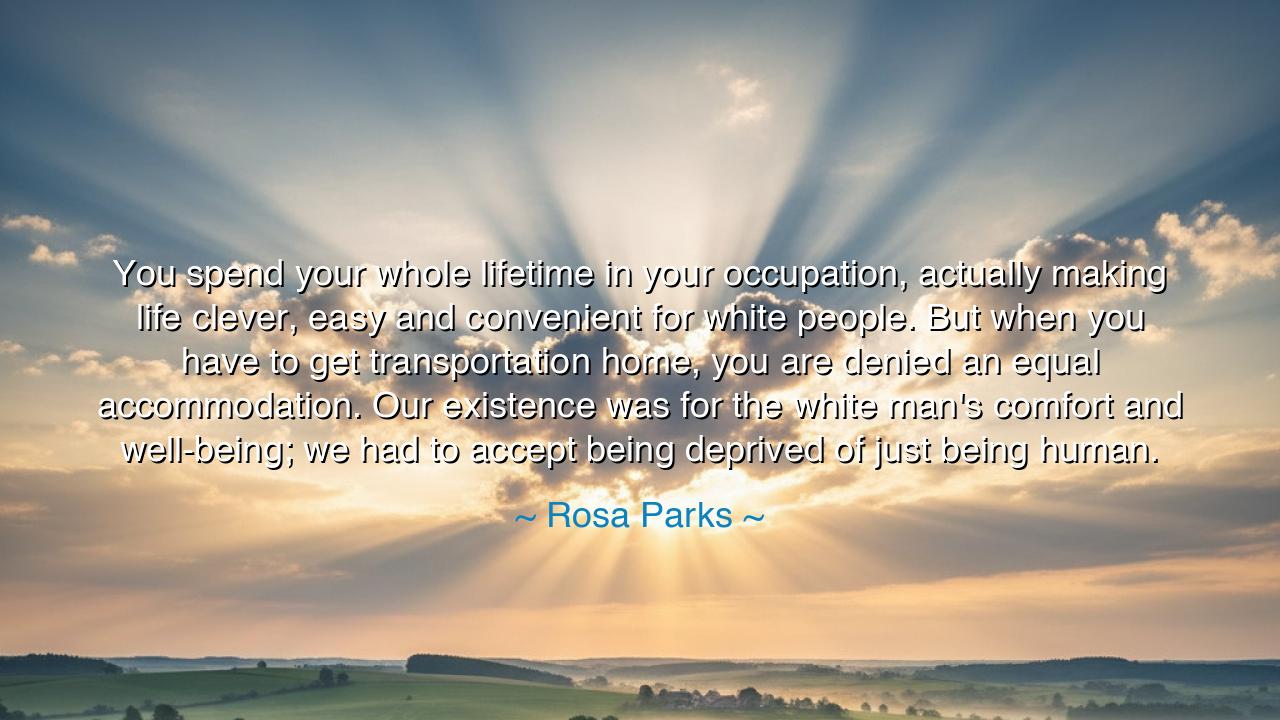
You spend your whole lifetime in your occupation, actually making
You spend your whole lifetime in your occupation, actually making life clever, easy and convenient for white people. But when you have to get transportation home, you are denied an equal accommodation. Our existence was for the white man's comfort and well-being; we had to accept being deprived of just being human.






In the words of Rosa Parks, spoken with the calm fire of truth, we hear the sorrow and the strength of generations: “You spend your whole lifetime in your occupation, actually making life clever, easy and convenient for white people. But when you have to get transportation home, you are denied an equal accommodation. Our existence was for the white man's comfort and well-being; we had to accept being deprived of just being human.” These are not the words of anger alone—they are the testimony of one who bore the weight of injustice and yet stood upright beneath it. In them, the ancient struggle for dignity breathes anew: the eternal cry of those who have been used, yet never truly seen.
In every age, there are those whose labor sustains the comfort of others, yet whose own lives are deemed unworthy of the same ease. Rosa Parks spoke not only for the Black workers of her time but for all whose hands have built empires they were never allowed to enter. The “occupation” she names is not simply a job—it is the pattern of a society where the fruits of one people’s toil are consumed by another’s privilege. This pattern, ancient as bondage itself, has ever been maintained by the cruel illusion that some are born to serve and others to rule. Yet Parks exposes the hypocrisy with a clarity that cuts to the bone: how can a nation call itself free when those who sustain it are denied their humanity?
Let us remember the day her quiet defiance became thunder. On December 1, 1955, in the city of Montgomery, Rosa Parks refused to surrender her seat to a white passenger. That small act, born of weariness and moral fire, set ablaze the spirit of a movement. She was not the first to feel the sting of degradation, nor the first to resist—but in that single moment, centuries of submission and silence began to fracture. Her refusal was no rebellion of pride, but an affirmation of sacred truth: that to be human is to be equal, and that to accept less is to wound the soul.
So it has ever been in the stories of the oppressed. The Hebrew slaves once built the cities of Egypt, yet could not walk in freedom within their walls. The serfs of old Europe tilled the fields that filled their masters’ tables, yet starved beneath the same sky. And in the land of America, the descendants of the enslaved washed, cooked, built, and nursed—crafting a civilization whose blessings were withheld from them. In every age, labor without dignity becomes a chain, and service without recognition becomes a slow death of the spirit. Parks’ words remind us that such chains, though invisible, crush the soul as surely as iron.
But Rosa Parks did not speak in despair. Her words, though heavy with truth, were meant to awaken—not to wound. She teaches that to endure injustice is not the same as to accept it, and that to name oppression is the first act of freedom. Like an ancient prophet, she bears witness to the human cost of a false peace—the peace that silences the suffering to preserve the comfort of the powerful. Her testimony calls each of us to a greater courage: to see the unseen, to hear the silenced, and to honor every life with equality and respect.
From her courage came the Montgomery Bus Boycott, a movement that lasted over a year, led by those who walked miles each day rather than yield to humiliation. Men and women who cleaned others’ homes, who cooked others’ meals, now walked side by side in quiet defiance, their footsteps becoming the drumbeat of liberation. Their march was not only through the streets of Montgomery—it was through the corridors of history, carrying forward the eternal truth that freedom is not given, but claimed. And their endurance broke the walls of segregation, proving that the might of justice lies not in arms, but in unity and faith.
The lesson is this: never allow the world to define your worth by the comfort you provide to others. You are not born to serve injustice but to bear light. If you labor, let it be with pride; if you suffer, let it awaken in you the will to rise. When you witness inequality—whether in your community, your workplace, or your nation—speak, act, and refuse silence. For every act of quiet courage, every refusal to bow, joins a sacred lineage of the free.
Remember the name Rosa Parks not merely as history, but as prophecy. Her words are a flame passed down to you: to burn away apathy, to illuminate truth, to restore the divine measure of humanity. Walk, then, as she walked—with calm defiance and unyielding grace—and ensure that no one’s existence is ever again treated as less than human. For to honor her words is to honor life itself.






AAdministratorAdministrator
Welcome, honored guests. Please leave a comment, we will respond soon